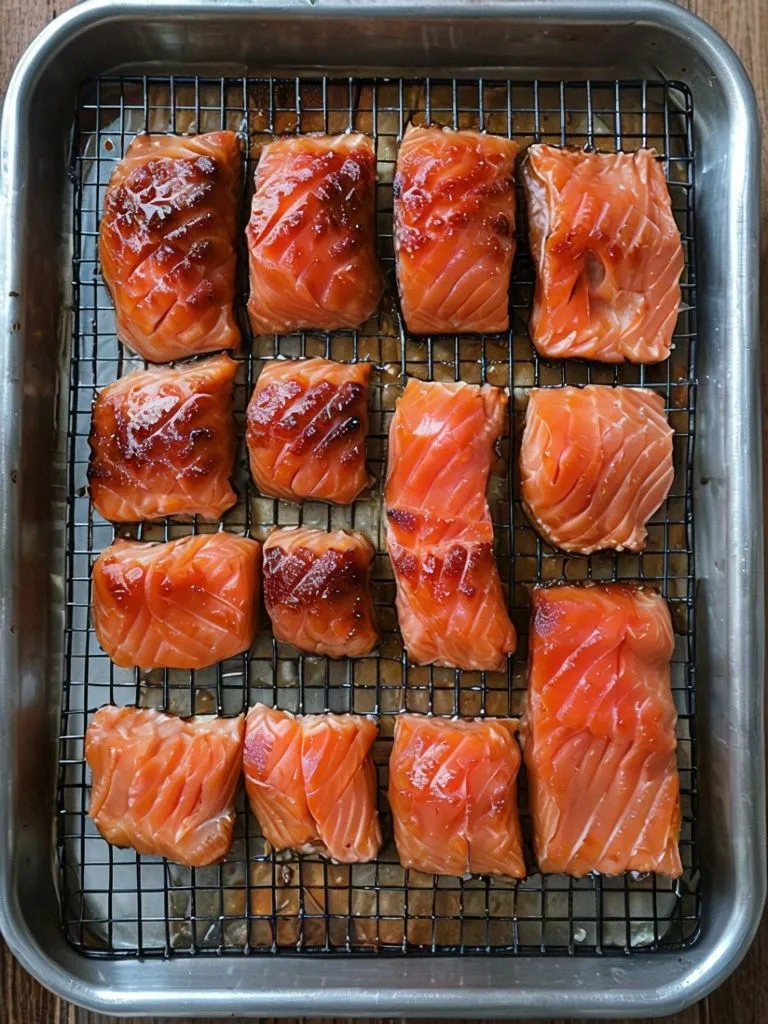Table of Contents
How to Smoke Salmon
Smoked salmon is a culinary delight that can transform any meal into a gourmet experience. Its rich, smoky flavor and tender texture make it a versatile ingredient for various dishes. Whether you’re a seasoned chef or a home cook, learning how to smoke salmon can elevate your cooking and impress your guests. In this comprehensive guide, we’ll explore smoked salmon recipes, step-by-step instructions for smoking salmon, and tips to perfect this delicious dish.
Smoked Salmon
Smoked salmon is a popular delicacy known for its distinctive flavor and texture. It is made by curing salmon fillets with salt and sugar, then smoking them over wood chips. This process imparts a rich, smoky taste and preserves the fish. Smoked salmon can be enjoyed on its own or used in a variety of recipes, from appetizers to main courses.
Ingredients smoked salmon recipes
For the Brine:
- 1/2 cup kosher salt: Used to cure the salmon and enhance its flavor.
- 1/2 cup brown sugar: Adds sweetness to balance the saltiness.
- 1 tablespoon black pepper: Provides a subtle spiciness.
- 1 tablespoon garlic powder: Adds depth of flavor.
- 1 tablespoon onion powder: Complements the garlic powder.
- 1 tablespoon paprika: For a hint of smokiness and color.
- 1 cup water: To dissolve the brine ingredients and ensure even curing.
For Smoking: smoked salmon recipes
- 1 to 2 pounds of fresh salmon fillets: Preferably with the skin on, which helps to hold the fish together during smoking.
- Wood chips: Choose from alder, hickory, or applewood for different flavor profiles.
Instructions
1. Prepare the Brine
- In a medium bowl, combine kosher salt, brown sugar, black pepper, garlic powder, onion powder, and paprika.
- Stir in the water until the salt and sugar are fully dissolved.
- Taste the brine and adjust seasoning if needed.
2. Cure the Salmon
- Rinse the salmon fillets under cold water and pat dry with paper towels.
- Place the fillets in a large resealable plastic bag or a shallow dish.
- Pour the brine over the salmon, ensuring that the fillets are fully submerged. Seal the bag or cover the dish.
- Refrigerate for 4 to 8 hours, depending on the thickness of the fillets. For thicker fillets, let them cure longer for more flavor.
3. Prepare the Smoker
- Preheat your smoker to 200°F (93°C). If you’re using a charcoal grill, set up a two-zone fire to control the heat.
- Soak the wood chips in water for at least 30 minutes to prevent them from burning too quickly. Drain before using.
- Place the soaked wood chips in the smoker box or directly on the coals if using a charcoal grill.
4. Smoke the Salmon
- Remove the salmon from the brine and rinse under cold water. Pat dry with paper towels.
- Place the salmon on the smoker grates, skin-side down. Ensure that the fillets are spaced out to allow for even smoke circulation.
- Smoke the salmon for 1 to 2 hours, or until the internal temperature reaches 140°F (60°C) and the fish flakes easily with a fork.
- If using a charcoal grill, keep the lid closed to maintain a consistent temperature and smoke level.
5. Finish and Store
- Once smoked, let the salmon cool to room temperature.
- Store the smoked salmon in an airtight container in the refrigerator for up to 1 week or freeze for longer storage.
Notes
- Brining Time: Adjust the brining time based on the thickness of the salmon fillets. Thin fillets may require less time, while thicker fillets need more time for the flavors to penetrate.
- Wood Chips: Experiment with different wood chips to find your preferred flavor. Alder wood provides a mild, delicate smoke, while hickory offers a stronger, more intense flavor.
- Smoker Temperature: Maintain a consistent temperature for even smoking. Avoid opening the smoker frequently, as this can cause temperature fluctuations.
Nutrition
Smoked salmon is not only delicious but also nutritious. It is a great source of high-quality protein, omega-3 fatty acids, and essential vitamins and minerals. Here’s a breakdown of the nutritional benefits of smoked salmon:
- Protein: Essential for muscle growth and repair.
- Omega-3 Fatty Acids: Support heart health and reduce inflammation.
- Vitamin D: Crucial for bone health and immune function.
- Vitamin B12: Important for nerve function and red blood cell production.

